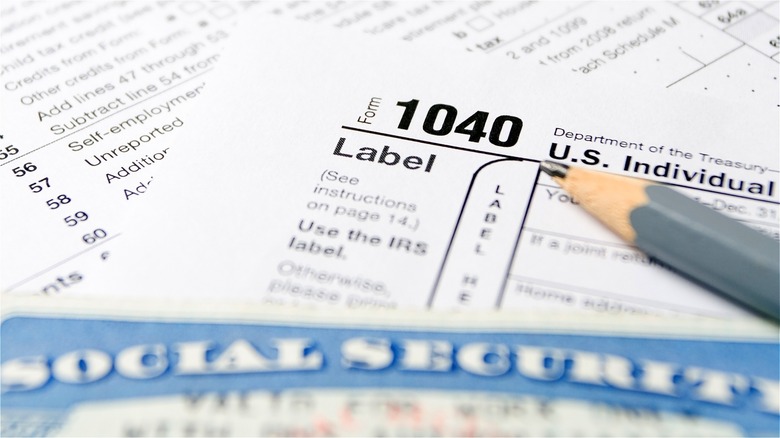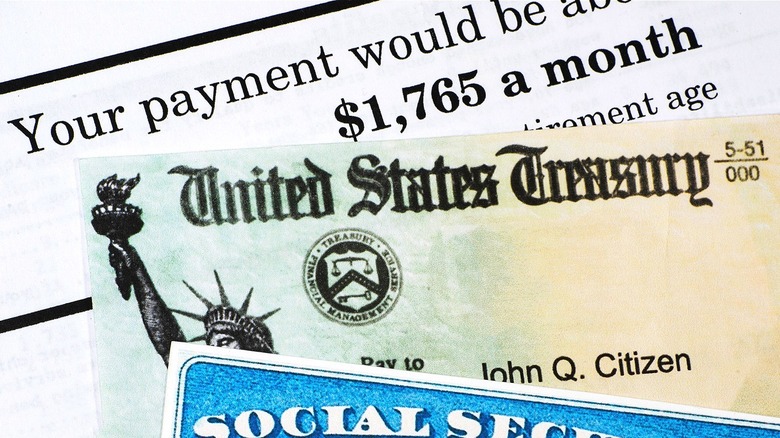Do You Pay Taxes On Social Security Income?
The majority of people in the United States who receive Social Security income don't pay taxes on their benefits, but an estimated 40% do, according to the Social Security Administration. How much you'll need to pay on your Social Security income depends on your other sources of income for the year; this makes up your combined income. This number and income thresholds for both individuals and married people determine if your benefits are taxable, and, if so, how much of it is. The highest percentage is 85%; everyone who receives Social Security gets at least a 15% tax exemption.
The SSA reports that retirees and their dependents accounted for nearly 77% of all Social Security benefits disbursed in 2022 — and that nine out of 10 Americans aged 65 and older receive benefits, with an estimated 40% paying some federal income taxes on a portion of those benefits. As for state income tax, 39 states and the District of Columbia won't tax Social Security benefits. Eleven states, however, will/do: Colorado, Connecticut, Kansas, Minnesota, Missouri, Montana, Nebraska, New Mexico, Rhode Island, Utah, and Vermont.
Calculating combined income
To determine if you need to pay taxes on your Social Security income, figure out your combined income; i.e., your total income from all sources, including earnings, retirement account withdrawals, Social Security benefits, etc. Once this number exceeds $25,000 (for individuals and $32,000 for married people), this is when taxes start to factor in.
If your combined income is greater than $25,000 but less than $34,000, up to 50% of your Social Security benefits are subject to federal income tax. If your combined income is greater than $34,000, then up to 85% of your benefits may be taxable. For married people, the thresholds are $32,000 to $44,000 for 50% and income exceeding $44,000 for 85%.
To make calculations, the IRS provides a worksheet in preparation for tax season. Further, you can get your specific numbers from your Social Security Benefit Statement (SSA-1099), which is mailed out every January, per the Social Security Administration. (The information is also available online from any my Social Security account after you create one.)
Based on SSA numbers, if Social Security is your only source of income, it's likely that you won't meet the above thresholds and your benefits won't be taxed. The average monthly benefit for retired workers and their dependents is $1,837, or $22,044 a year. As for the states that tax Social Security income, each uses a different formula based on income, tax rates, and exemptions. To know how your benefits may be taxed, check with your state tax agency.
Staying below the taxable threshold
If your combined income exceeds the thresholds to pay taxes and your Social Security income is taxed, note that how much you pay on that portion is determined by federal income tax rates based on income level and filing status. So, for example, if you're a single filer and your combined income is $30,000 (falling in the $25,000 to $34,000 range), up to 50% of your Social Security income will be taxed. If your benefit is the average of $22,044, then expect around $11,000 to be taxed at the relevant tax rate.
Note, you can start to receive Social Security retirement benefits at age 62, but to receive the full benefit, you'll need to wait until age 67 (for anyone born after 1960). Considering this, one way to lower your combined income, and thus possibly get below the taxable threshold, is to lower your future taxable income.
One strategy is to start withdrawing from your tax-deferred retirement accounts starting at age 59 ½ (not earlier, to avoid withdrawal penalties from cashing out your 401(k) or IRA early), and using the money before you begin to draw Social Security benefits. As Adam Shell of AARP explains, doing so will 1) lower your future taxable income (and reduce your required minimum distributions) and 2) allow you to delay claiming your Social Security benefits, which, remember, increases by 8% every year after full retirement age, up until age 70, per the SSA. While you may still need to pay taxes, a lower combined income may help you go from a 15% tax exemption to 50%.


